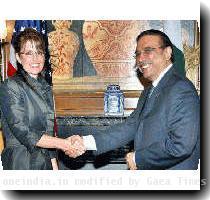Security forces kill 5 foreign militants in hospital raid in NW Pakistan, say intel officials
By Ishtiaq Mahsud, APThursday, December 31, 2009
Pakistani security forces kill 5 foreign militants
DERA ISMAIL KHAN, Pakistan — The Pakistani army raided a hospital used by militants in the country’s lawless tribal area near the Afghan border Thursday, killing five foreign fighters, intelligence officials said.
The soldiers also captured 27 militants, 10 of whom were wounded in the gunbattle that broke out during the raid in South Waziristan, a Pakistani Taliban stronghold targeted by the army in a major ground offensive in mid-October, the officials said.
It was unclear whether the troops suffered any casualties, said the officials, speaking on condition of anonymity because they were not authorized to talk to the media.
The 30,000 soldiers who invaded South Waziristan have secured much of the territory, but many of the militants are believed to have fled to other tribal areas in the northwest to avoid the fighting.
The offensive sparked a wave of retaliatory violence that has killed more than 500 people in a little over two months, including a bombing against a Shiite Muslim procession in the southern city of Karachi on Monday that killed 44 people.
The Pakistani Taliban claimed responsibility for the bombing Wednesday, a sign the militants may be escalating their war against the state with a rare attack in Pakistan’s commercial hub.
The bombing underscored the group’s ability to strike far from its sanctuary in the northwest and its determination to hit back at the government for the South Waziristan offensive.
Attacking Karachi “means they’re trying to expand their frontiers of terrorism,” retired general and military analyst Talat Masood said.
Although the teeming city of about 15 million has often been the scene of sectarian, ethnic and political violence, the Pakistani Taliban have rarely claimed any attacks there. Many analysts believe the group has spared it in the past because its militants used the city as a haven to raise money and to rest.
But on Wednesday, the group announced it was behind the bombing of minority Shiites marking the holy day of Ashoura as they marched through the heart of Karachi.
“We claim responsibility for the attack on the Shiite procession,” Asmatullah Shaheen, a Taliban spokesman, told The Associated Press in a telephone call from an undisclosed location. He did not give a reason, but said one of the group’s men was sent to Karachi the day before the procession to carry out the bombing.
The bloodshed was intended as a message that the Taliban can strike “from Khyber (in the northwest) to Karachi,” explained Masood, the military analyst.
“They’re trying to say that it’s possible; and it is possible for them because after all, it only takes a person, a few persons, to carry out this act. And they have plenty of those who are disposable and available to them,” he said.
President Asif Ali Zardari has speculated the motive was to spark sectarian conflict that could complicate the government’s battle against the Pakistani Taliban.
Pakistan has a history of violence between extremist elements among its majority Sunni Muslim and minority Shiite communities. Although the Taliban are not known for launching sectarian attacks, they have associations with Sunni militant groups that have targeted minority Shiites, whom they regard as heretical.
It is unclear whether the Taliban carried out the bombing on its own or received help from other militant groups that officials say have a joint goal to destabilize Pakistan.
Authorities say sectarian groups have teamed up with Taliban and al-Qaida militants waging war against the government in a joint effort to destabilize Pakistan.
The bombing sparked rioting that destroyed buildings and thousands of shops in central Karachi, causing millions of dollars in damage. Parts of Bolton Market, the country’s largest wholesale market, were still smoldering on Wednesday, more than 48 hours after the attack.
Mobs roamed the streets immediately after the blast, setting fire to nearby buildings, firing guns into the air and throwing stones at security forces who had been assigned to protect the procession.
Officials initially blamed Shiites in the procession for the rioting but later said it was a planned conspiracy — a stance that may be intended to temper sectarian tensions.
Sunni religious leaders and politicians in Karachi have called for a strike to protest the attack and ensuing violent rampage. They have urged businesses and public transport companies to shut down Friday, a move that could paralyze the city.
____
Associated Press writers Hussain Afzal in Parachinar and Riaz Khan in Peshawar contributed to this report.
Tags: As-pakistan, Asia, Asif Ali Zardari, Dera Ismail Khan, Karachi, Pakistan, Religious Strife, South Asia

